"It is important to maintain a sense of the overall spending commitment as we work together to rebuild the devastated communities of the Gulf Coast."
Judd Gregg,
Senate Budget Committee Chairman
Tuesday, September 20, 2005 09:09 GMT
Rita Relief Rally
Rita wasn't nearly as bad as feared and by Friday afternoon, with oil markets staging a retreat, the greenback rally began in earnest as EUR/USD bids first broke 1.2150 then 1.2100 and came close to testing the psychologically important 1.20 level. For the week the dollar gained 157 basis points against the euro buoyed mostly by the its increasing interest rate differential which expanded to 175 basis points after the Fed hike on Tuesday.
Rates and growth appear to be the key themes as we move into the fall trading season. As long as US maintains its 3% economic growth, Fed hikes are likely to continue which will fuel even more dollar buying from carry speculators. That premise will be sorely tested however as we move into next week. Traders will watch Durable Goods numbers projected to rebound 1% from last month's 4.9% plunge as well the critical Chicago PMI report on Friday. Last month Chicago PMI showed the largest drop in the survey' s history falling below the critical 50 boom/bust level. If the Chicago PMI numbers climb back above the expansionary threshold, the just as with Rita US economic data may have escaped a far gloomier fate.
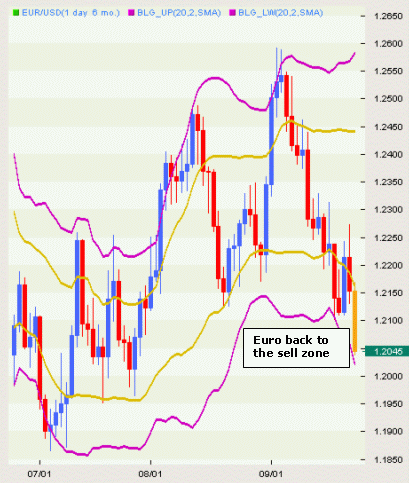
"Interest rates in the euro zone are at their lowest level thanks to confidence in price stability inspired by ECB policy. The ECB will not hesitate to impose sanctions against countries that fail to respect the rules laid out in the stability pact."
Jean-Claude Trichet,
European Central Bank President
Wednesday, September 21, 2005 08:41 GMT
Still Nothing New
Political negotiations continued in Germany as Merkel desperately tried to construct the coalition government without Schroeder's Socialists. She even held talks with the Greens, but the coalition of environmentalists, free-marketers and conservative CDU just did not seem like a likely possibility. The choice for Germany appears increasingly clear - “grand coalition” or new elections. The political uncertainly is sure to pressure the euro further, but as Barron s quipped this week-end, the German's are quickly coming to a realization that they don't really need a government in order to run the country.
Meantime the IFO survey will the marquee economic release of the week and it will be interesting to see just how big an impact the political impasse is having on the business community. Finally, one of the more obscure but effective EU indicators - Belgium's leading economic index registered a strong recovery from -10.9 in August to -5.6 in September. Since tiny Belgium exports 75% of its GDP to the EU nations its serves as very accurate gauge of future EU demand
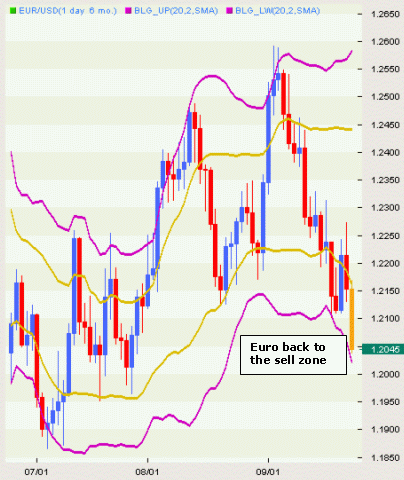
"Japan's consumer prices should start rising above year-ago levels around October and enter an uptrend next year, although the rises would likely be modest."
Kiyohiko Nishimura,
Bank of Japan Board Member.
Wednesday, September 21, 2005 10:16 GMT
OIl Hampers Yen
The Yen fell this week as a Japanese government report showed the trade balance by almost 80% from a year ago as increasing oil prices drove up the value of imports in August.
The week was not all doom as gloom however, as convenience store sales figures dropped by 1.3% as compared to last month's drop of 4.7%. Though the number was still contracting at least the trend was in the right direction, However the Tertiary Index was down by 0.8% despite the market expecting a 0.9% rise.
Next week's calendar is packed, with sales figures and industrial order numbers dominating the landscape. Market expects large retailers sales to be slightly down from last month's level. If Hurricane Rita bypasses the refineries this weekend, the Yen could gain strength as oil prices drop back from their current elevated levels.
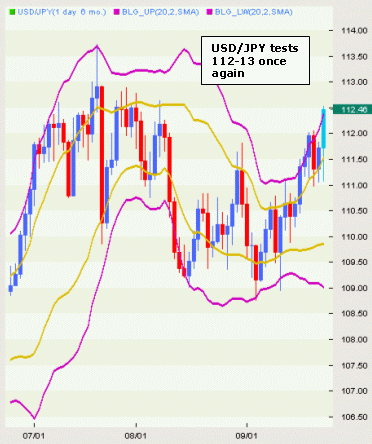
"A combination of weak consumer spending and challenging world markets is weighing on UK manufacturing, following the sector's contraction over the first half of the year. Cost pressures from high oil and transportation prices will only serve to depress profits further."
Ian McCafferty,
CBI's Chief Economic Adviser
Thursday, September 22, 2005 15:39 GMT
The Dive Continues
The pound took a tumble last week and broke the 1.8000 figure on poor UK data. The CBI's manufacturing orders book balance was at -27 showing sharply falling orders. The data turned attention once again to the possibility of a interest rate cut in November despite the BOE choosing to keep rates at 4.50% in September's meeting.
The one positive of the week was that House prices fell at the slowest pace for almost a year in August after the BOE's rate cut revived confidence in the housing market. The RICS house price balance rose to -26 in August from -34 in July.
GDP numbers and current account figures will dominate this week. If economic growth is lower than market expectations and the current account deficit for the second quarter increases, expect further downward pressure on the Cable.
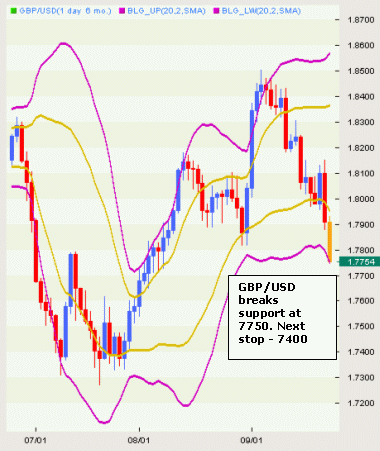
Franc Funding
Swissie continued to record the worst performance of all the majors, despite the best fundamentals in the field. The Franc lost more than 100 pips in its average daily price over the course of the week. A quiet news week in Switzerland meant that markets were primarily focused on the FOMC's Tuesday meeting. The swissie with its miniscule 75bp interest rate is becoming the victim of carry funding and that dynamic may not end until SNB begins to tighten.
The main story this week saw Swiss trade balance fall to 0.08B from last month's level of 0.74 B deepening Swissie's gloom. The lone bright spot was real retail sales figures that showed a 5.5% increase in July.
The Franc will wait and watch the effects of Hurricane Rita this weekend. Next week is a slow news week with only two releases scheduled, the consumption and leading indicators respectively. This would mean the Swissie will be driven by oil prices and subsequent USD reactions.
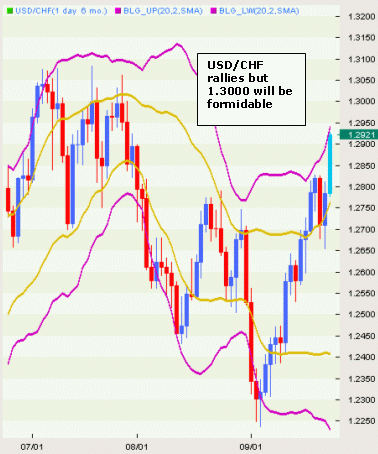
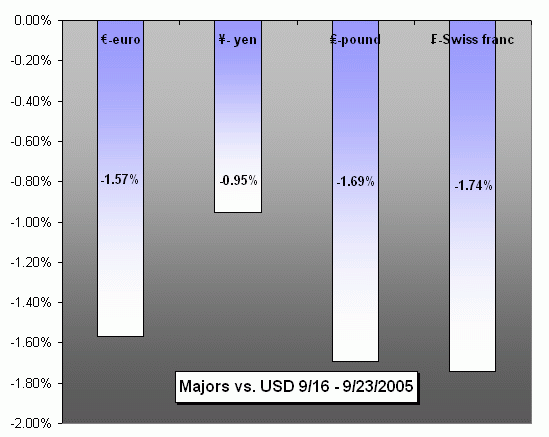
Boris Schlossberg is a Senior Currency Strategist at FXCM.